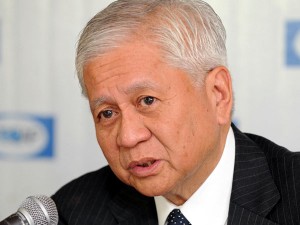Philippines, DFA hurdled tests of 2011, says Del Rosario
The Philippines’ adept response to the succeeding waves of high-impact global events this year—from the Arab Spring to the worldwide economic and debt crises—has “underscored our resilience as a nation,” according to Foreign Secretary Albert del Rosario.
In a statement, Del Rosario on Thursday noted that “the passing year rained extraordinary challenges.”
But, he said, “we remained steadfast, hopeful and optimistic with the victories we gained.”
“In the spirit of genuine public service, the men and women of the Department of Foreign Affairs marched through the storms with dedication, commitment and fortitude… Looking back, we see how much we have achieved by being true to our duties and responsibilities,” he stressed.
Del Rosario expressed confidence that in 2012, the DFA would “do more, serve better and reach beyond our grasp.”
Article continues after this advertisementOn Thursday, the agency released a 13-page report on its top 14 accomplishments this year.
Article continues after this advertisementThe achievements, Del Rosario said, were “in accordance with the three pillars of Philippine foreign policy,” which are the preservation and enhancement of national security; promotion and attainment of economic security, and protection of the rights and welfare of overseas Filipino workers.
The foreign office’s major accomplishments included the following:
- Secured a 17-percent increase (about $21.4 million) in the Obama administration’s proposed appropriation for the Philippines from $123.27 million this year to $144.66 million next year;
- Obtained an additional $53 million in coastal watch radar systems from Washington;
- Received more than $1.8 million in military and law enforcement assistance from China;
- Entered into a framework arrangement with South Korea for the provision of $500 million in soft loans to finance the upgrading of the Coast Guard information and communication systems;
- Proposed the concept of a Zone of Peace, Freedom, Friendship and Cooperation in the West Philippine Sea (South China Sea) among the six Spratlys claimant countries—the Philippines, China, Taiwan, Vietnam, Malaysia and Brunei;
- Entered into new defense cooperation agreements with Israel, Italy, Spain and Vietnam;
- Campaigned for the election of Sen. Miriam Defensor-Santiago to the International Criminal Court;
- Coordinated President Aquino’s official and state visits to the United States, China and other countries;
- Promoted the government’s tourism program, including a two-way, three-million tourist arrivals project between Manila and Beijing;
10. Made substantial interventions toward resolution of government-negotiated contracts, such as the NorthRail project with China; roll-on roll-off project with France; Laguna Lake rehabilitation project with Belgium, and Fraport-Naia 3 project with Germany;
11. Obtained Apec funding for 14 human resource development projects worth $1.5 million;
12. Released over P304.4 million for repatriation and medical expenses of more than 10,400 OFWs in troubled Middle East states;
13. Coordinated with local and foreign law enforcement agencies in the arrest and prosecution of drug syndicates victimizing OFWs;
14. Worked for the release of over 80 Filipino seafarers held by Somali pirates.
Del Rosario has repeatedly said that “the foreign policy of the Aquino administration will be one of full engagement and friendship.”
Extend its grasp
According to the DFA chief, “the three pillars will be strongly pursued under the present administration’s agenda of national development and good governance.”
“The Philippines will endeavor to reach beyond its grasp in economic diplomacy, in the protection of the rights and welfare of Filipinos overseas, and strengthening national security,” he emphasized.
The DFA “will be more aggressive in engaging with our traditional economic and commercial partners in East Asia, North America and Europe, and new ones in South and Central Asia, South America, the Middle East and Africa. We will ensure that our economic diplomacy will be anchored in transparent and stable policies that create a domestic condition attractive to foreign investors.”
On top of stronger bilateral relations, Del Rosario said the DFA “shall continue to pursue cooperation with multilateral partners,” like the 10-member Association of Southeast Asian Nations, Apec and United Nations agencies whose work impact on Philippine development goals.
Protecting the rights and promoting the welfare of overseas Filipino workers will continue to be a strong pillar of the country’s foreign policy, he said.
Magnitude of diaspora
“The sheer magnitude of the Filipino diaspora prompts us to pursue and enhance bilateral agreements, regional arrangements and international standards affecting migrant workers,” Del Rosario said.
On the promotion of national security, he pointed out that “it is the DFA’s major concern to build a safe and secure environment not only within the bounds of our territory, but also regionally and globally because in the global village, the national security of one affects the security of others.”
Asean “will be a cornerstone in this endeavor,” he said.
The DFA “will also build upon the country’s strong defense partnership with the US and will engage China, India, Japan and other regional partners, such as South Korea, Australia, New Zealand and Indonesia, in mutually beneficial security and defense dialogues.”
“The interplay of the three pillars, when translated into real action, actually means the interplay of Philippine relations with other countries,” he said.
